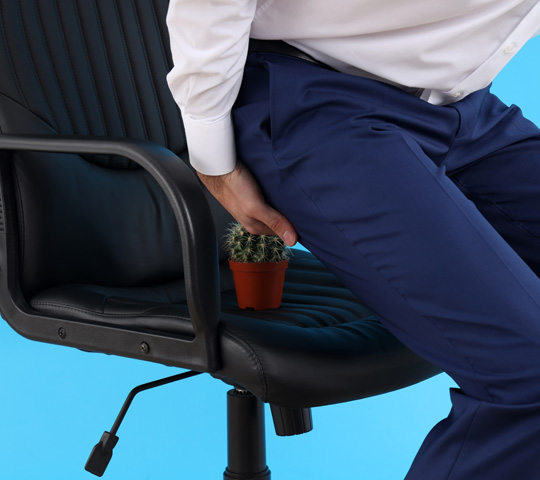If you have an anal fissure, you might notice:
- Really bad pain when you go to the bathroom
- Pain that sticks around for a long time after you poop
- A small bump of skin next to the tear
- You can see a tear in the skin around your bottom
- Red blood in your poop or on the toilet paper after you wipe
- Itching or a burning feeling in your bottom
If you or your child has these problems, it’s important to see a doctor right away.
The doctor may ask about your medical history to look for risk factors that may have caused your anal fissures. He/she may then perform a physical examination to gently inspect the anal region and look for visible tears and cuts.
An acute anal fissure may look like a tiny cut in the skin resembling a fresh papercut. A chronic anal fissure may be a deeper cut and have a fleshy growth, either internal or external or both. The location of your anal fissure may help determine its cause as well. For instance, an anal fissure that develops on the side of the anal opening could be due to inflammatory bowel disease, such as Crohn’s disease.
Your doctor may recommend the following tests to confirm the diagnosis of anal fissures:
- Anoscopy The doctor will insert a tiny tube-like device called an anoscope into your anal region to examine the anus and rectum. It will help the doctor determine the location and severity of the fissure.
- Flexible sigmoidoscopy The doctor will insert a small tube equipped with a camera at the bottom of your colon. It will help the doctor determine the location of the anal fissures. This test may be performed only if you are younger than 50 years and have no possible risk factors for intestinal cancer or colon cancer.
- Colonoscopy This test may be done to inspect the entire colon. The doctor will insert a tubular device into your rectum to look for fissures. Your doctor may perform this test if you are older than 50 years, have risk factors for colon cancer, or show signs of other underlying medical conditions.
In most cases, anal fissures resolve on their own in a few weeks. To promote healing and to relax the anal sphincter, your doctor may recommend:
- Increasing your intake of fluids and high-fiber foods
- Soaking your anal region in warm water for 10 to 15 minutes a day
If your symptoms continue to worsen, your doctor may recommend alternative treatment options for anal fissures which include:
Non-surgical treatment options
These include:
- Blood pressure medications: To help relax the anal sphincter, your doctor may recommend medications such as Diltiazem or Nifedipine. These medications can either be taken orally as pills or applied externally to the affected region.
- Nitroglycerin: This may help increase the blood flow to the anal region and promote healing of the anal sphincter. Nitroglycerin is considered to be an effective treatment option when other options fail to work. You may experience some side-effects of taking nitroglycerin which in some cases, can be severe.
- Anesthetic creams: Your doctor may recommend topical creams that contain lidocaine hydrochloride to help provide relief from pain and discomfort.
- Injections: An injection of botulinum toxin type A may be given to paralyze the anal sphincter and help relax spasms.
Surgical treatment options
Your doctor may recommend surgery if your anal fissures are chronic and if your symptoms continue to worsen over time.
The surgeon may perform a procedure known as lateral internal sphincterotomy to treat anal fissures. It involves removing a small piece of the anal sphincter muscle to provide relief from pain and spasms and promote healing.
Result in The outcome of anal fissure surgery is usually positive. Studies have shown that in severe cases of anal fissures, surgery is proven to be most effective.
Most cases of anal fissure surgery have no complications, but some patients may experience minor complications such as:
- Fecal incontinence
- Infection
- Unexpected bleeding
- Perianal abscess
Why choose Dr. Mutha Laser Clinic?
Every anal fissure patient requires an individual approach, Dr. Neha Mutha is renowned as the best fissure specialist in Pune and is available at Dr. Mutha Laser Clinic Pune for the treatment of various piles, fistulas, and other anal diseases.

